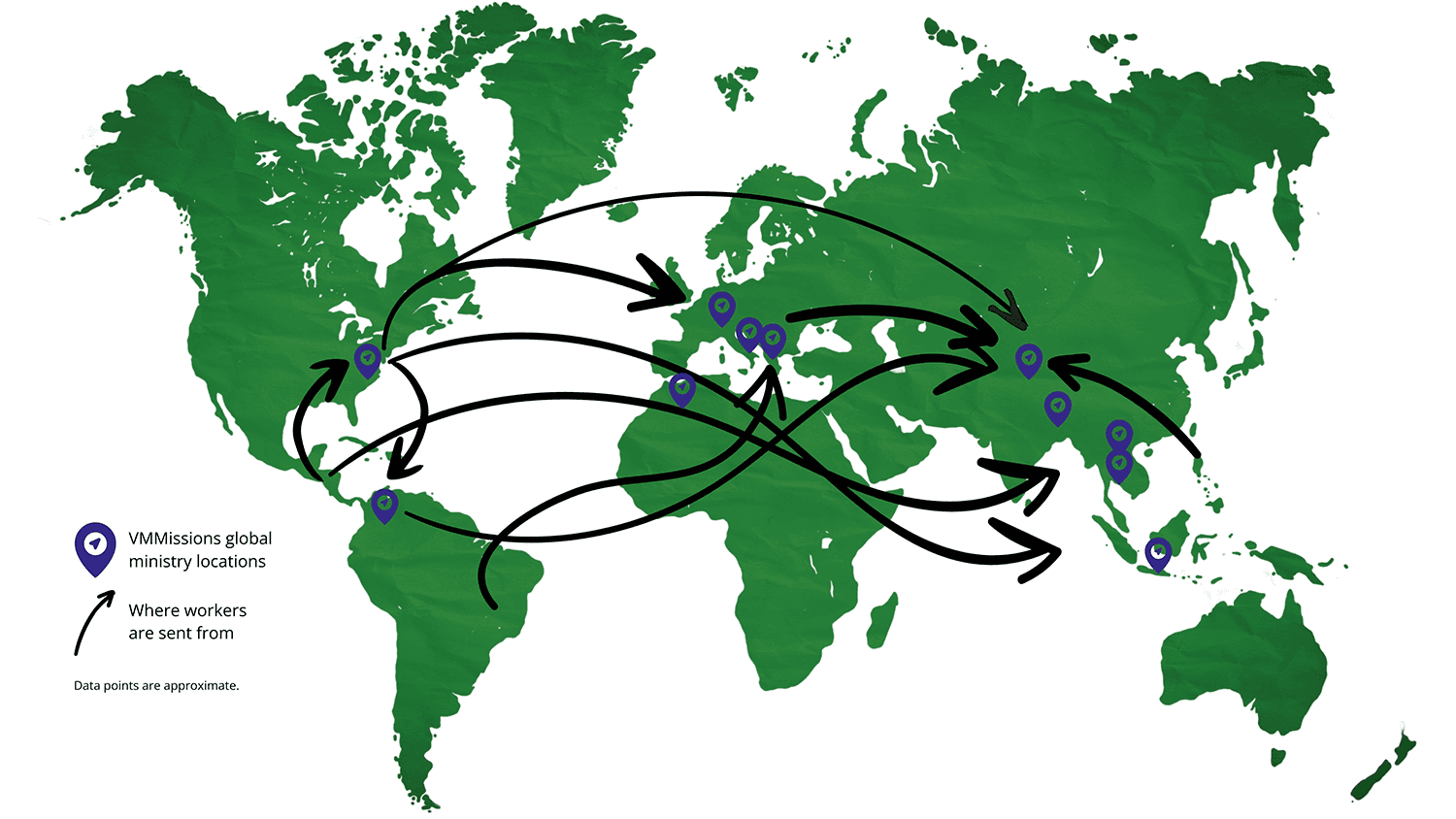From Everywhere to Everyone
One third of VMMissions workers are now sent from global Christian centers once viewed as the “mission field.”
By Kierston Kreider
 Christian mission is, and has always been to some degree, multidirectional in nature. As the word of God takes root within people and cultures, they rise up as partners with the missionaries who first shared the gospel with them. This dynamic has characterized Christian history from its conception in the book of Acts.
Christian mission is, and has always been to some degree, multidirectional in nature. As the word of God takes root within people and cultures, they rise up as partners with the missionaries who first shared the gospel with them. This dynamic has characterized Christian history from its conception in the book of Acts.
However, one of the unfortunate consequences of colonialism on mission has been a hesitancy to partner with emerging churches. “The four most dangerous words in the global church today are ‘I don’t need you,’” said Michael Oh in his opening message this year at the Fourth Lausanne Congress on World Evangelization in Seoul, South Korea. He noted that we must recognize our need for each other in all areas to see God’s mission accomplished. Just as the eye can’t say it doesn’t need the foot, nor the ear to the hand, so it must be within the body of Christ (1 Corinthians 12:12-27).
VMMissions workers come from many places today, and are sent into assignments across the globe.
Map: Jon Trotter/VMMissions
Protestant mission over the past two centuries has largely been characterized as “from the West to the Rest.” It was primarily Europe and then the U.S. that sent missionaries to the rest of the world. Missionary sending throughout history has largely been out of the centers of Christian influence and power to the places “where Christ was not known” (Romans 15:20). Mission came to be viewed as directional, from the wealthy and elite to the poor and marginalized lower classes.
In spite of this, over the last century the church around the world has seen incredible growth where these missionaries faithfully sowed the gospel. During this same period, however, the church in the West has seen a drastic decline. This has resulted in a shift in where the majority of Christians live. Christianity today is polycentric. While the West remains a center of Christianity, multiple other centers have emerged, including South Korea, Brazil, the Philippines, South Africa, Ethiopia, Nigeria, and even China and Iran, among others.
As these new centers of Christianity rise in power and influence, they have also been sending large numbers of missionaries across the globe, including to the Western countries and to one another. Therefore, mission today is characterized as being “from everyone to everywhere.” Part of this new dynamic is that many people are being sent as mission workers from economically poorer areas in the world to the wealthy and affluent areas.
Migrant workers and refugees from these new centers of Christianity are planting churches and sharing the gospel with the people around them.
- Ethiopian taxi drivers in Saudi Arabia share the gospel as they drive clients around.
- Filipino houseworkers share their faith with their Saudi or Emirati employers.
- Central American immigrants plant churches in the U.S.
- Egyptian church planters work among huge numbers of Arabic-speaking refugees and immigrants in the U.S. and Europe.
- Brazilian missionaries share the gospel with Yemeni refugees in Malaysia. Some of these Yemenis go as missionaries themselves to still other countries!
At the same time, Brazil continues receiving missionaries from countries like Uruguay and the U.S. This same dynamic is happening across the globe. Countries are no longer classified as either a mission force or a mission field; countries can be both missionary receivers and senders.
God has enabled VMMissions to call and send mission workers to five continents.
While the centers of Christianity have changed, these dynamics are far from unique to the twenty-first century. In the book of Acts, we see something similar taking place. In the beginning, Jerusalem and Judea were the centers of Christianity. Then the Jewish believers were scattered due to persecution in Jerusalem, and some ended up in Antioch. They began preaching to Greeks and not just to Jews. As a large number of Greeks began responding to the gospel message, the church leaders in Jerusalem sent Barnabas to encourage them, and he in turn recruited Saul to join him. Later, these leaders sent Saul and Barnabas out as missionaries.
The church in Antioch was emerging as a missionary sending church within only a few years of being planted. It became an influential center that spread out to other parts of the world and shaped the future of Christianity. In the years that followed, Rome, Alexandria, and Carthage also emerged as other centers of Christianity in both theology and missionary sending.
Mennonites who migrated to the Shenandoah Valley wanted to share their faith with their neighbors. When VMMissions was founded 105 years ago, the vision was to send the early missionaries to plant churches in the surrounding states of West Virginia, Tennessee, and Kentucky. The wind of the Spirit later opened doors for mission presence in Italy, Jamaica, and Trinidad, and workers were sent internationally.
Since then, God has enabled VMMissions to send out workers to five continents. Many are now being sent from the Majority World, the developing countries of Asia, Africa, and Latin America, places formerly viewed as mission fields.
VMMissions has been living into this shifting reality in many ways. Currently, a third of VMMissions workers come from the Majority World. Honduran, Mexican, Salvadorian, and Egyptian workers are planting churches here in the U.S., and there are Filipino, Colombian, Romanian, Brazilian, and Honduran workers serving in Albania, Central Asia, and South Asia.
Though this shift has been rewarding and fruitful, there have been accompanying challenges, such as worker funding, visa delays and denials, and lack of missiological training. The Global Church Planting fund established in VMMissions’ recent “Church of Many Cultures” campaign enables mission workers from less affluent regions to be sent by allocating money for worker support.
Similarly, the Business for Transformation fund has empowered businesses and entrepreneurs from around the world to have a greater impact for God’s kingdom in their communities, with a strategic focus on areas unreached by the gospel of Jesus.
Revelation 7:9 provides a glorious picture of “a great multitude that no one could count, from every nation, tribe, people and language, standing before the throne and before the Lamb.” VMMissions is joining with the global church to send and receive workers from everywhere to everyone. God is doing a new thing! We want to faithfully keep in step with the Spirit’s leading.
Kierston Kreider is Mission Mobilizer for VMMissions.

